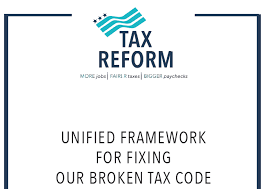 We know a lot less about the recently proposed federal tax reform than we think we know.
We know a lot less about the recently proposed federal tax reform than we think we know.
We don’t know what major income tax deductions will stay or go in the final bill. Nobody does, because it’s a highly contested political process right now.
Most importantly, we don’t know what effect, if any, lower taxes rates will have on national economic growth and deficits. We know what tax reform advocates have said, but that’s speculative and unproven. There are even more things we don’t know, but let’s talk about just these two, one at a time.
To start, tax deductions in particular remain a giant mystery. Just as soon as the GOP Congress and Trump White House announced the Unified Framework for Fixing Our Broken Tax Code on September 27th, Democratic opposition leaders zeroed in on deductions for state and local taxes. Eliminating that deduction would theoretically raise an estimated $1.3 trillion in additional tax revenue. But then National Economic Council Director Gary Cohn quickly backtracked on the state and local tax deduction saying “we are willing to work with the tax writers on the other dials that we have in the system.”
That’s just one of the many deductions that might, or might not, end up eliminated in the final bill, as Republican representatives in relatively high-tax states also spoke out in favor of this loophole, err, deduction.

FYI “deductions” are things we personally and justifiably benefit from, whereas these are called “loopholes” if somebody else benefits from them. Anyway.
The elimination of tax deductions is absolutely key to this reform, which promised both tax code simplicity and revenue neutrality. The only way you achieve both simplicity and neutrality is by slashing tax deductions down to practically nothing, which the proposed framework did. But then, per Cohn, maybe it didn’t. We don’t know yet.
On the issue of other deductions, the framework proposes a blanket $12,000 deduction for individuals and $24,000 for couples, meant to simplify and substantially eliminate most other deductions. So far, home mortgage interest deductions and charitable contribution deductions are the only ones “safe,” and other presumably popular deductions like for medical expenses, and dependents (aka children) go away. Again, we’ll see.
On the issue of national economic growth, the mantra from reformers focuses on faster economic growth in the economy, which therefore prevents deficits.
Supply-side economist Glenn Hubbard argued in the Wall Street Journal that this tax reform, when combined with lower business regulations, would create 3 percent growth in the economy.
Gary Cohn also stated that the point of tax reform is to achieve 3 percent growth in the economy.
One dividing line on whether one should support this reform, or not, is whether you believe in this 3 percent target, or not.
The summary big idea of supply-side economics is that if you lower taxes, the additional money in households and businesses boosts consumption and investment, and therefore the entire economy. How much it boosts is open to substantial debate.
On an $18 trillion US economy, the difference between, say, 1 and 3 percent growth is astonishing. In fact, it’s everything.
Three percent growth in the economy translates to $540 billion in additional national wealth per year, which happens to be approximately the size of annual federal government deficits lately.
So why does that matter? Here’s my simple fiscal view: If the nation is richer by $540 bucks next year but also borrows $540 bucks (note: I’m leaving off the billion to keep dollars within the human-brain range) we can plausibly say that we’re equally well-off from a “national wealth” standpoint, but at a more pleasant-for-everyone, lower rate of taxation. So that seems enjoyable, as well as responsible.
On the other hand, if the supply side growth thesis is wrong, and we grow less than 3 percent, then we’ve enacted an irresponsible tax cut that worsens our fiscal situation, making us weaker economically as a nation.
So which is it? I would argue we don’t know. The supply side reformers have a theory, which is unproven at best.
The Treasury Department under President George W. Bush studied the supply side effects of the Bush tax cuts of 2001 to 2003, finding that growth could be higher by 0.7 per year, under specific conditions, such as not having to raise taxes later to pay for temporary tax cuts. The next logical step to their theory is that if growth increases, then the tax base is bigger, and tax cuts do not increase government deficits. A lower tax rate on a higher base keeps revenues the same, goes the theory.
On the other hand, supply side theoreticians typically feel much more confident describing the positive effects of lowering taxes when individual rates are above 40%, which they are currently not. So that’s a problem for supply-siders.
President Bush’s own Chairman of the Council of Economic Advisors Gregory Mankiw wrote a response to that Bush-era model, finding that tax cuts only “paid for themselves” by 17 percent for individual taxes and 50 percent for taxes on things like dividends and capital gains. Logically, if tax cuts don’t “pay for themselves” through dramatically higher growth, you either have to raise taxes later or you get a giant increase in government deficits.
Now, Mankiw literally wrote the modern economics textbook that everyone reads these days and he’s no bleeding heart liberal. Yet he found the strongest claims of supply-siders not credible.
The point is not for me to say definitively which one is right or wrong, I’ll let the actual economists fight it out in their position papers. The point is the grand theory of this tax cut is far from certain, despite the confidence with which reformers sell their idea.
In the absence of knowing the answers, we fill in the gaps on this tax proposal according to our own pre-set ideas.
A version of this post ran in the San Antonio Express News and Houston Chronicle.
Please see related post:
Adult conversation about Income Taxes
Post read (110) times.






